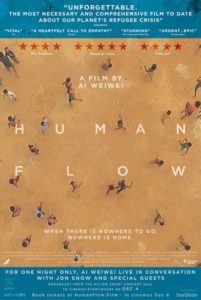 The world is awash in people who cannot stay in their homes because of war or famine or climate or any number of other tragedies that might make remaining impossible. Who are they and what happens to them once they strike out to find a safe place? That’s what this sprawling documentary from Chinese activist artist Ai Weiwei attempts to tell us. It’s not a pretty picture (though there is some gorgeous cinematography), and there is no solution given to the heartbreaking international crisis. But if anything the film is a call for the world to wake up and deal with a problem that will not go away on its own.
The world is awash in people who cannot stay in their homes because of war or famine or climate or any number of other tragedies that might make remaining impossible. Who are they and what happens to them once they strike out to find a safe place? That’s what this sprawling documentary from Chinese activist artist Ai Weiwei attempts to tell us. It’s not a pretty picture (though there is some gorgeous cinematography), and there is no solution given to the heartbreaking international crisis. But if anything the film is a call for the world to wake up and deal with a problem that will not go away on its own.
Ai doesn’t tell. He shows. There isn’t much dialogue or preaching about the issue. The film takes you into refugee camps, on long slogging walks with refugees trying to reach a border crossing, to the shores of the Mediterranean where the flow is non-stop from N. Africa. You hear stories of the atrocities committed on these people before they left their homes, before they lived in camps with only what they could carry. Rohingyas from Bhurma, Syrians, Iraqis, Somalies, Palestinians. Many of them had nice middle class lives, now disrupted for who knows how long. A generation of kids not going to schools. As I said, it’s bleak.
Ai places himself in scenes as our surrogate, asking questions, giving a needed hug, being there. He’s making sure that all these people are not just statistics, that these kids playing in the dirt of their camps have a human face, that the world watches. The film is a bit long, and Ai plays a bit fast and loose with some of his statistics, but Human Flow is a worthy rallying cry by an artist with the power to speak to the world. I watched it the day after a snow storm, and the theater was freezing, but I kept thinking about how my discomfort would be over as soon as I left the theater, and the people in the film would still be cold and wet and in dire need of a home through no fault of their own. I hope a lot of people see this film and act.
If you’re wondering what you can do to help, here’s a great article about who needs help. And here’s a great organization to support doing this critical work.
